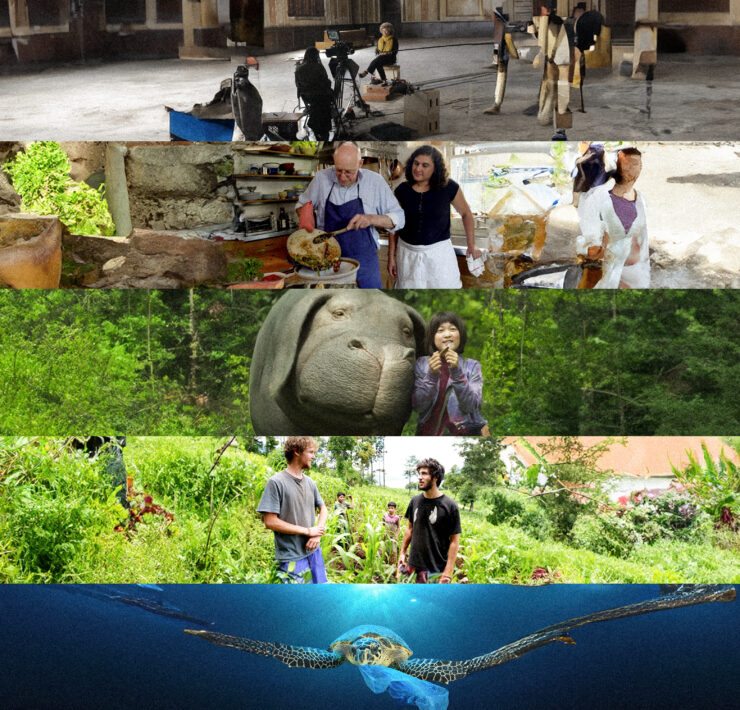The song opens with a whispered acknowledgment of failure: “I used to float, now I just fall down.” Billie Eilish expresses self-doubt so poignantly in her closing ballad for the Barbie movie, “What Was I Made For?” Her wistful vocals convey the gap between childhood innocence when we played freely and now, when the weight of the world causes us to tumble.
In director Greta Gerwig’s blockbuster Barbie, a doll meant to be played with as an idealized, aspirational toy is struggling with feelings of imperfection and death (even while dancing). So Barbie, played by Margot Robbie, embarks upon a journey of discovery, beyond the boundaries of her Dream House. Her exploration is rooted in angst regarding the inevitability of death and our collective longing for purpose.
Billie steps into Barbie’s shoes, where the pressures of conforming to an ideal clash with her longing to be real. Reduced to a commodity, she’s cut off from her feelings. This tension can short-circuit our creative pursuits. The pressure to perform, to be perfect, can overwhelm us when we know our shortcomings. Having experienced joy, we wrestle with how to process complex feelings of sadness. Doubt and indecision stymie us. Our earlier confidence is replaced by the haunting question, “What Was I Made For?”
In an interview with Allure, Eilish recalled writing the song with her brother Finneas “in a period of time where we couldn’t have been less inspired and less creative.” Despite winning seven Grammys and an Oscar, Eilish felt like a failure, “We’ve lost it. Why are we even doing this?” “It” is the ability to create, to find something new to say. In reflecting upon Barbie’s search for significance, Billie connected with her own creative crisis. Only after finishing the song, Eilish “realized it was about me. It’s everything I feel. And it’s not just me—everyone feels like that, eventually.” For Barbie, for Billie, the song is a search for meaning, for something we’re made for.
As a producer, Finneas builds a subtle mix of strings while layering in Billie’s background harmonies that support her lead vocal. These polished sounds only reinforce the direct expression in the lyrics. This weekend, Billie and Finneas will likely win Grammys for Song and Record of the Year before accepting a probable second Oscar for “Best Original Song” in March.
“What Was I Made For?” is the song of the year because it is also the question of the era. It captures the anxious zeitgeist prompted by the rise of generative A.I. Its efficiency make us question our purpose but we must also ask, “What was A.I. made for?” What exactly are we doing with it? Is it supposed to give us more time to deal with life’s bigger questions? With “menial” tasks (like reading and writing, painting and drawing) simplified, we can seemingly carve out additional space for groundbreaking research and innovation.
Instead, it is prompting even more anxiety, offering shortcuts enabled by machine learning. Authors, musicians, and artists are increasingly discovering that is a coded term for copyright theft. Students and teachers wonder if it can read faster and generate quicker, then why bother? What is homework made for? In a voracious search for predictability, artificial intelligence is gobbling up whatever data sets and artistic creativity is placed on its path – with or without creators’ consent. Artificial intelligence is built upon human intelligence. Its predictions are rooted in all that we’ve said and made before. Copyright lawyers may be the only attorneys to benefit from such brazen theft.
In an age of artificiality, Billie and Barbie traffic in authenticity. Eilish directs and stars in her own video for the song. She dresses as her younger self, playing with dolls, trying on outfits and roles. Who can I be? Doctor, debutante, surfer? Child’s play is inherently unpredictable and inefficient. Creativity is about surprise, discovering something you didn’t know about a character, the world or ourselves. In the feature film, Ruth Hendler, the founder of Mattel, offers advice to her confused creation. Barbie seeks permission to become human. Yet, Ruth suggests that Barbie already has plenty of self-determination. How will she exercise that freedom? Can we recover what it means to be authentic and human while everything is being reduced to predictive algorithms?
On a visit to the Computer History Museum in Silicon Valley, I was struck by their exhibit celebrating the arrival of self-driving cars. It suggested how much smoother and safer traffic will be with A.I. behind the wheel. Riders were pictured inside a car, with their hands-free to type and scroll on their devices. The promise was clear: “If the car drives you, then you can spend more time on computers.” We can work more. Earlier. Reclaiming our time — so we can spend more hours on social media and spreadsheets. But what if we enjoy driving? The sense of agency we retain, to adjust our speed and music to match our mood is liberating. Will we still notice slight differences in the sunlight or in our neighborhoods if we no longer need to watch the road? Doesn’t driving help us process our thoughts? It is rare, unstructured time to contemplate where we’re heading or what we’ve just encountered. It is an opportunity to rewind or unwind or even daydream.
Barbie’s ability to discover a world beyond her imagination is rooted in driving. A road trip in her pink Corvette inspires new possibilities. In the age of A.I., Barbie and Billie remind us that H.I. – human imagination, ingenuity, and inspiration — remains our enduring super-power. What are we made for? To create, to drive, to sing, to dream.























